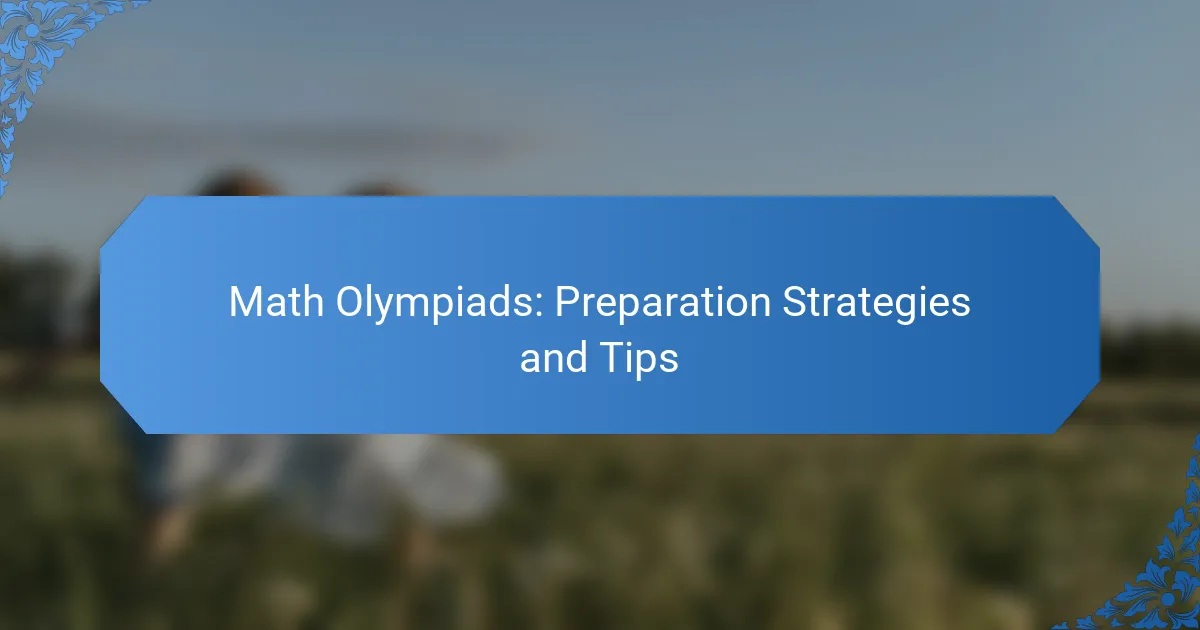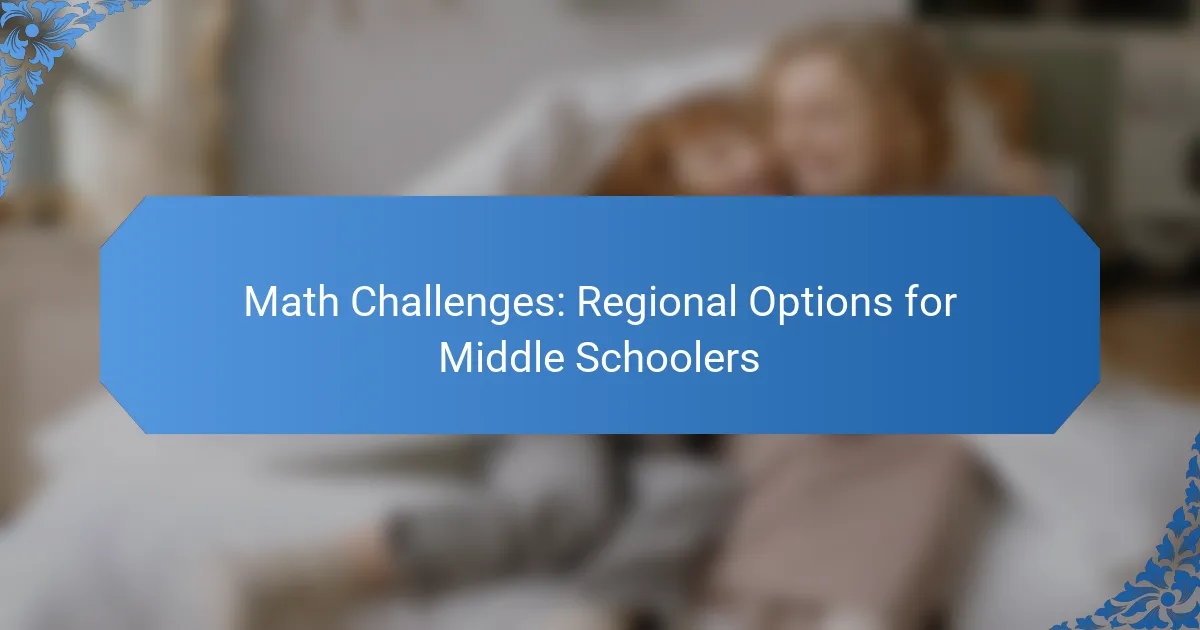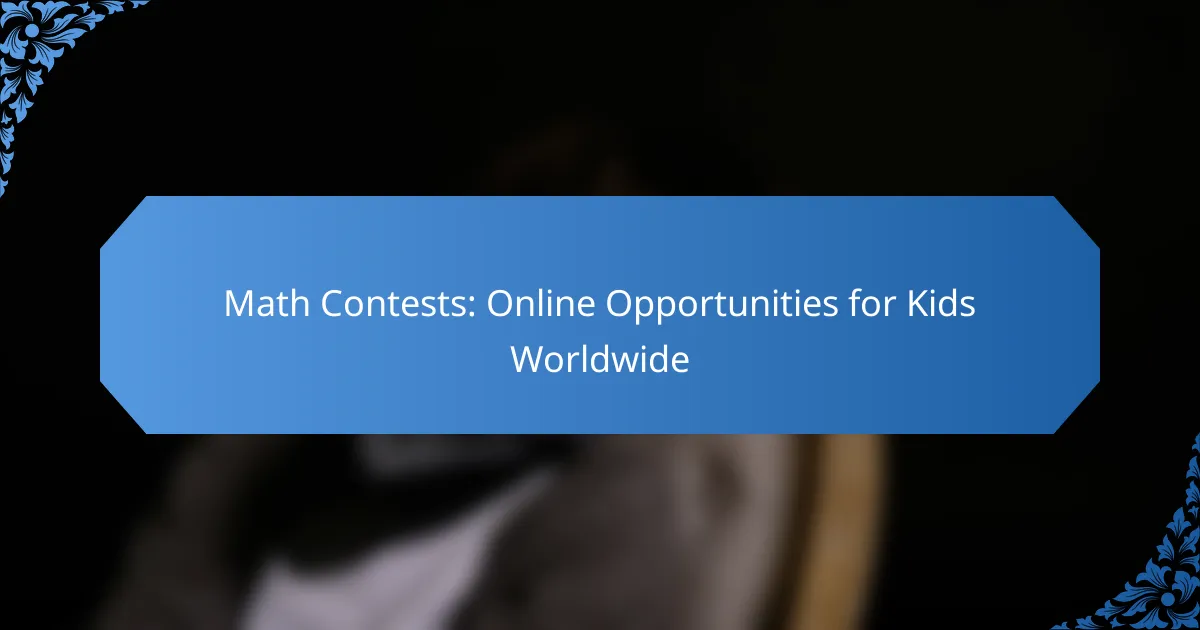Preparing for Math Olympiads requires a strategic approach that combines structured study plans, practice with past papers, and participation in math clubs. By utilizing various resources such as books and online courses, students can enhance their problem-solving skills and develop effective strategies for tackling challenging problems. Mastering time management and learning from both successes and mistakes are also crucial for achieving success in these competitive environments. For those interested, math competitions and challenges can provide valuable experience.
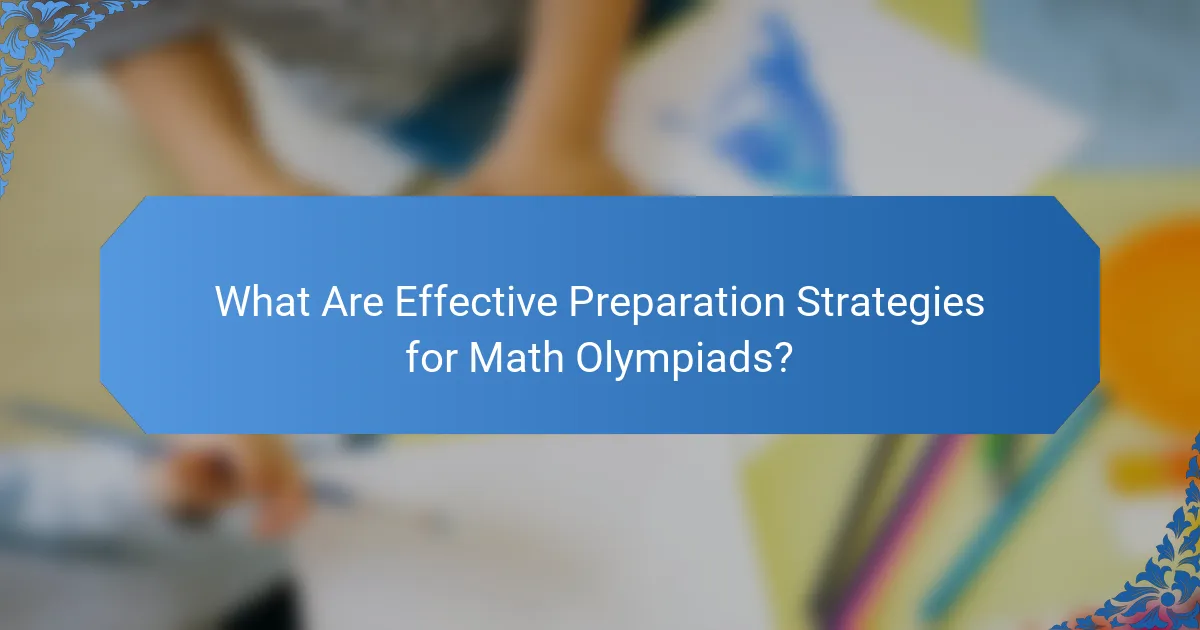
What Are Effective Preparation Strategies for Math Olympiads?
Effective preparation strategies for Math Olympiads include structured study plans, practice with past papers, joining math clubs, utilizing online courses for advanced topics, and mastering time management techniques. These approaches help students build a strong foundation, enhance problem-solving skills, and develop the necessary mindset for competition.
Structured study plans
Creating a structured study plan is essential for systematic preparation. Allocate specific time slots each week dedicated to different mathematical topics, ensuring a balanced approach that covers all areas of the syllabus. For example, you might focus on algebra for two days, geometry for another two, and number theory for the remaining days.
Incorporate regular assessments to track your progress and adjust your plan as needed. Aim for a mix of theory and practice, dedicating time to both understanding concepts and solving problems.
Practice with past papers
Practicing with past Math Olympiad papers is one of the most effective ways to prepare. This familiarizes you with the exam format, question types, and time constraints. Aim to complete at least one past paper every week, gradually increasing the difficulty as you improve.
After completing each paper, review your answers thoroughly to identify areas for improvement. Focus on understanding mistakes and revisiting concepts that were challenging.
Join math clubs
Joining a math club can provide a supportive environment for learning and collaboration. These clubs often host problem-solving sessions, competitions, and workshops that enhance your skills and expose you to new problem-solving techniques. Look for clubs at your school or local community centers.
Engaging with peers who share similar interests can motivate you and provide valuable insights. Consider participating in group study sessions to tackle complex problems together.
Online courses for advanced topics
Online courses can be a valuable resource for mastering advanced mathematical topics relevant to Math Olympiads. Platforms like Coursera or Khan Academy offer courses on specific subjects such as combinatorics, graph theory, and advanced calculus. Choose courses that align with your weaknesses or areas of interest.
Set aside time each week to work through these courses, ensuring you apply what you learn through practice problems. This structured approach helps deepen your understanding and prepares you for challenging questions.
Time management techniques
Effective time management is crucial during Math Olympiads. Practice solving problems under timed conditions to simulate the exam environment. Use techniques like the Pomodoro Technique, where you work for 25 minutes followed by a 5-minute break, to maintain focus and avoid burnout.
During the exam, allocate your time wisely by quickly assessing the difficulty of each question. Tackle easier problems first to secure points, then return to more challenging ones if time allows. This strategy can help maximize your score and reduce stress during the competition.
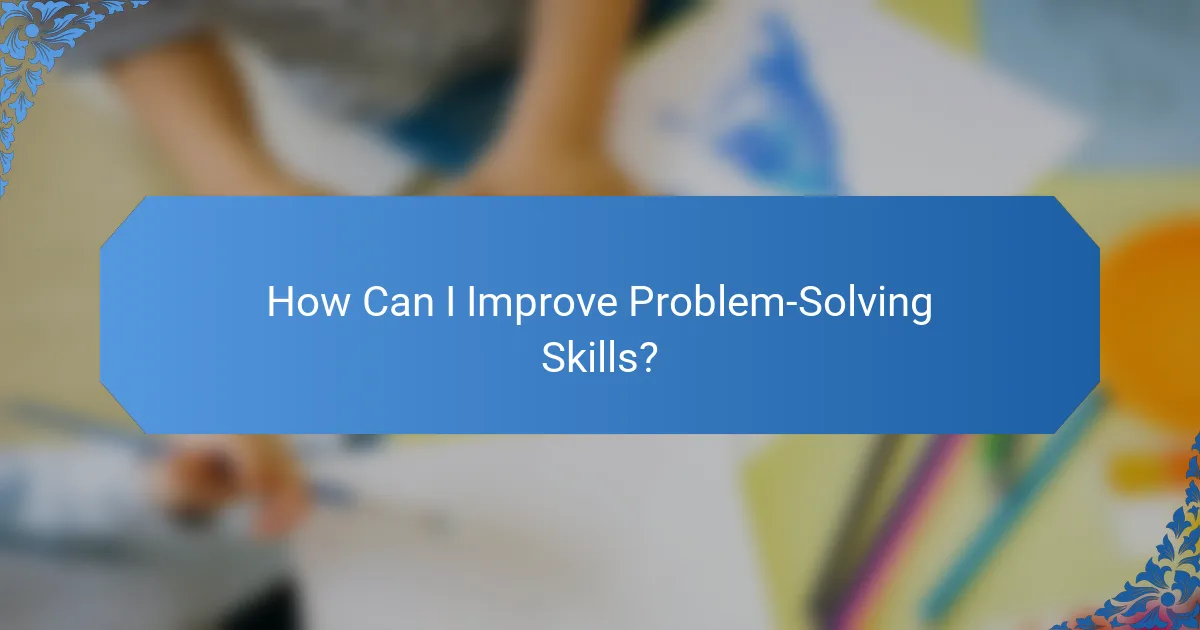
How Can I Improve Problem-Solving Skills?
Improving problem-solving skills involves practicing a variety of mathematical challenges and developing strategies to tackle them effectively. Focus on understanding different approaches and learning from both successes and mistakes.
Focus on diverse problem types
Engaging with a wide range of problem types is crucial for enhancing your problem-solving abilities. This includes algebra, geometry, combinatorics, and number theory. By exposing yourself to various topics, you can identify your strengths and weaknesses, allowing for targeted improvement.
Consider practicing problems from past Math Olympiads or other competitions. Aim to solve problems that challenge your current understanding and push you beyond your comfort zone. Regularly revisiting different categories will help solidify your knowledge and adaptability.
Learn from solution walkthroughs
Studying solution walkthroughs can significantly enhance your problem-solving skills. These resources often provide step-by-step explanations that reveal the reasoning behind each solution. By analyzing these methods, you can learn new techniques and strategies that you can apply to similar problems in the future.
Utilize online platforms or books that offer detailed solutions to Olympiad problems. Take notes on the approaches used and try to replicate them in your practice. This method helps reinforce your learning and allows you to see different perspectives on problem-solving.
Participate in mock competitions
Mock competitions simulate the pressure and time constraints of actual Math Olympiads, helping you develop essential skills. Participating in these events allows you to practice pacing yourself and managing stress, which are critical during real competitions.
Join local math clubs or online forums that organize mock contests. Aim to participate regularly, as this will not only improve your skills but also build your confidence. After each mock competition, review your performance to identify areas for improvement and adjust your study strategies accordingly.
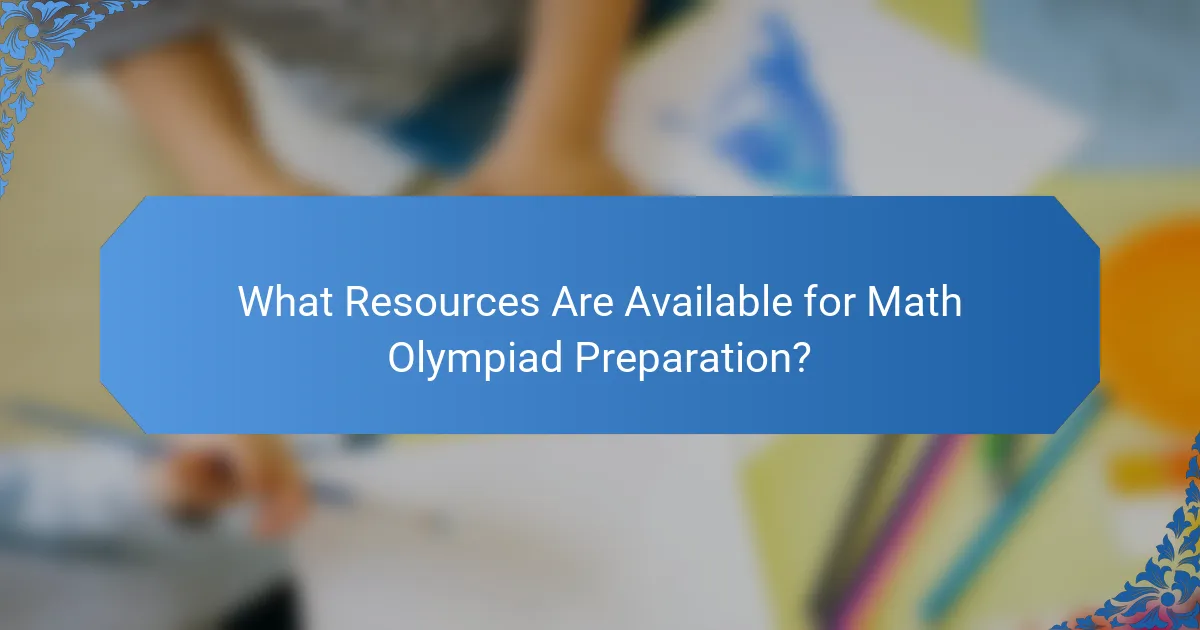
What Resources Are Available for Math Olympiad Preparation?
Various resources are available for Math Olympiad preparation, including books, online platforms, and mobile apps. These tools can help students enhance their problem-solving skills and familiarize themselves with the types of questions typically found in competitions.
Books by authors like Titu Andreescu
Books authored by Titu Andreescu and similar mathematicians are invaluable for Math Olympiad preparation. Titles such as “Mathematical Olympiad Challenges” and “Cyclic Inequalities” offer a wealth of problems and solutions that deepen understanding of advanced mathematical concepts.
When selecting books, look for those that provide clear explanations and a variety of problems, ranging from basic to challenging. This approach ensures a comprehensive grasp of topics, which is crucial for success in competitions.
Online platforms like Art of Problem Solving
Online platforms such as Art of Problem Solving (AoPS) provide structured courses and a community for aspiring Olympians. AoPS offers resources like interactive problem sets, forums for discussion, and live classes that cater to different skill levels.
Engaging with these platforms can help students practice consistently and receive feedback from peers and instructors. Consider participating in online competitions hosted by these platforms to simulate the actual Olympiad experience.
Mobile apps for practice
Mobile apps can be a convenient way to practice Math Olympiad problems on the go. Apps like “Brilliant” and “Math Olympiad Trainer” offer a range of problems and interactive lessons that can enhance problem-solving skills.
When using mobile apps, aim for daily practice sessions, even if they are short, to build and maintain mathematical proficiency. Look for apps that track progress and adapt to your skill level, ensuring a personalized learning experience.
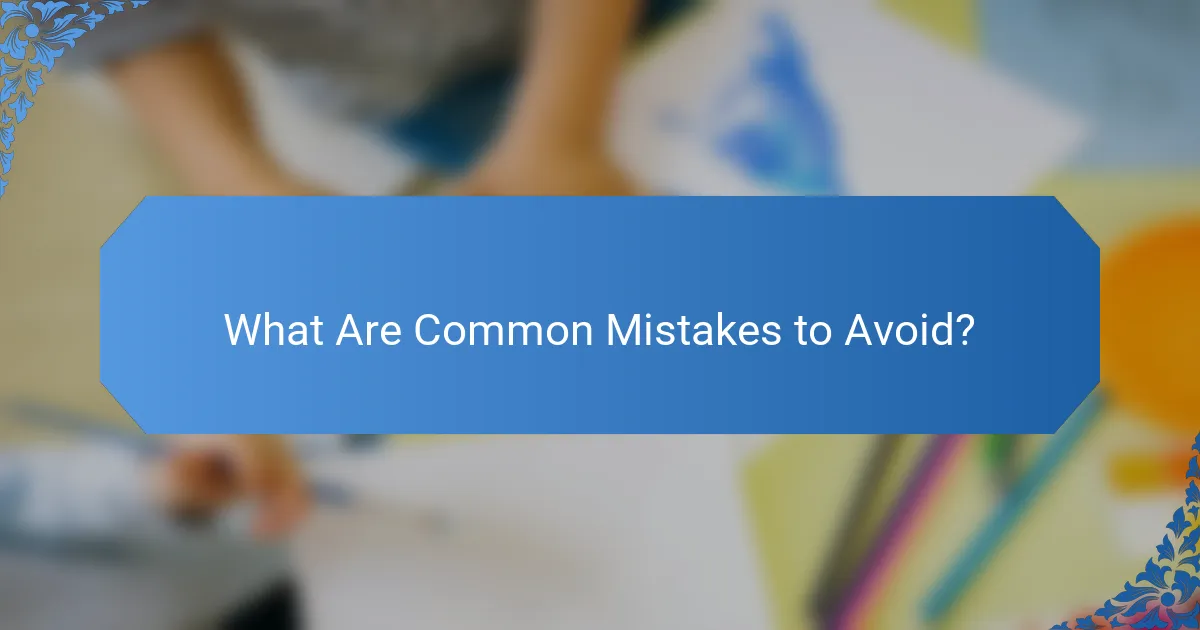
What Are Common Mistakes to Avoid?
Common mistakes in Math Olympiad preparation can hinder performance and understanding. Avoiding these pitfalls can significantly enhance your chances of success.
Neglecting foundational concepts
Ignoring foundational concepts is a frequent error among Math Olympiad participants. A strong grasp of basic principles in algebra, geometry, and number theory is essential, as advanced problems often build on these fundamentals.
To avoid this mistake, regularly review core topics and ensure you can solve basic problems quickly and accurately. Consider using resources like textbooks or online platforms that focus on foundational skills.
Overlooking time management
Time management is critical during both preparation and the actual competition. Many students underestimate the time required for solving complex problems, leading to rushed answers or incomplete solutions.
Practice under timed conditions to develop a sense of pacing. Aim to allocate specific time limits for each question during practice sessions, and adjust based on your performance. A common strategy is to spend no more than 5-7 minutes on each problem in a timed setting.
Ignoring feedback from mentors
Feedback from mentors is invaluable, yet many students fail to seek or act on it. Constructive criticism can highlight areas for improvement and provide insights that self-study may overlook.
Regularly consult with teachers or experienced peers to discuss your problem-solving approaches. Actively seek their input on your solutions and be open to making adjustments based on their recommendations. This collaboration can lead to significant improvements in your understanding and performance.
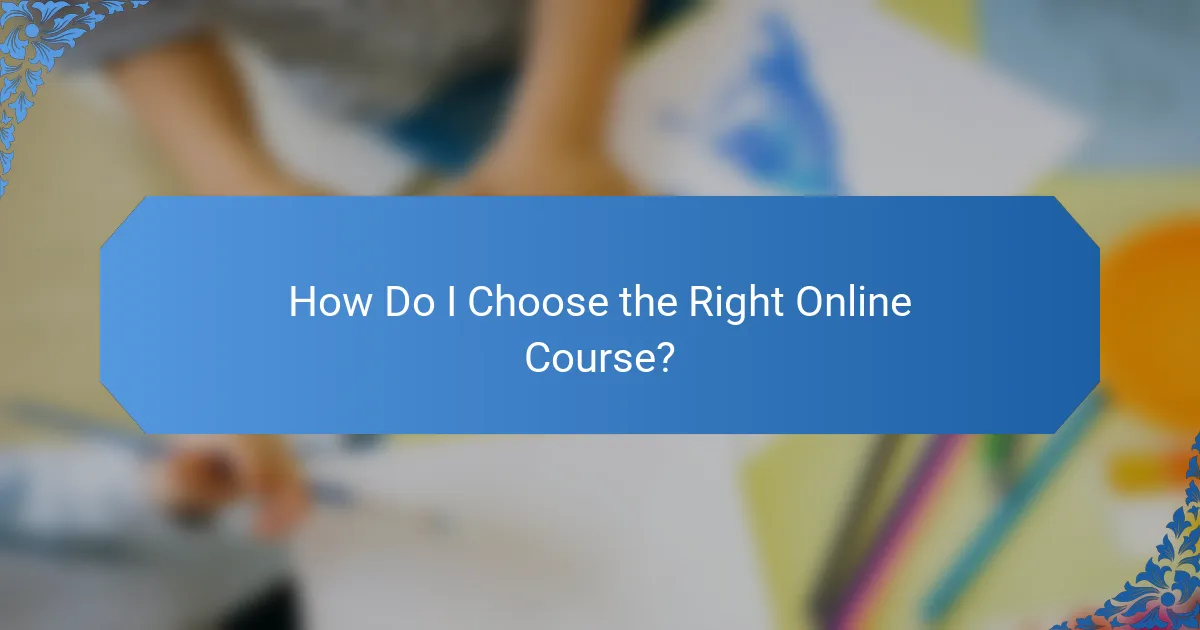
How Do I Choose the Right Online Course?
Choosing the right online course for Math Olympiad preparation involves assessing the course’s content, the qualifications of the instructor, and feedback from previous students. A well-structured course tailored to your needs can significantly enhance your learning experience.
Evaluate course content and syllabus
Start by reviewing the course content and syllabus to ensure it covers essential topics relevant to Math Olympiads. Look for courses that include problem-solving techniques, advanced mathematical concepts, and practice tests that mirror actual Olympiad questions.
Consider whether the course offers a mix of theoretical knowledge and practical exercises. A balanced approach helps reinforce learning and prepares you for the types of questions you will encounter in competitions.
Check instructor qualifications
Investigate the qualifications of the course instructor to ensure they have a strong background in mathematics and experience with Olympiad coaching. Instructors who have successfully guided students in past competitions can provide valuable insights and strategies.
Look for credentials such as advanced degrees in mathematics or teaching experience in competitive environments. An instructor’s ability to communicate complex concepts clearly is equally important for effective learning.
Read reviews from past students
Reading reviews from past students can provide insight into the course’s effectiveness and the instructor’s teaching style. Look for feedback on how well the course prepared students for Math Olympiads and whether it met their expectations.
Pay attention to comments about the course structure, resource availability, and instructor responsiveness. A course with consistently positive reviews is more likely to offer a rewarding learning experience.

What Are the Benefits of Joining a Math Olympiad Community?
Joining a Math Olympiad community offers numerous advantages, including access to resources, mentorship, and a supportive environment. These communities foster collaboration among students, enhancing problem-solving skills and encouraging a deeper understanding of mathematical concepts.
Networking with peers
Networking with peers in a Math Olympiad community allows participants to share knowledge and strategies. Engaging with fellow math enthusiasts can lead to collaborative study sessions, where members tackle challenging problems together, enhancing their skills through discussion and teamwork.
Building relationships with peers also opens doors to mentorship opportunities. Experienced members or coaches can provide guidance, share resources, and offer insights into effective preparation techniques. This support can be invaluable, especially for those new to competitive mathematics.
To maximize networking benefits, actively participate in community events, forums, or online groups. Attend workshops or competitions to meet others face-to-face, and don’t hesitate to reach out to peers for study partnerships.
